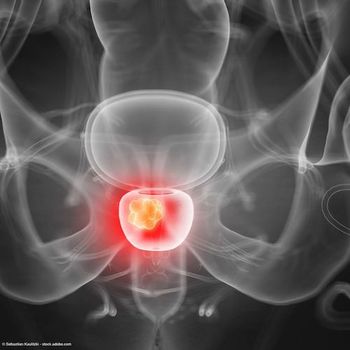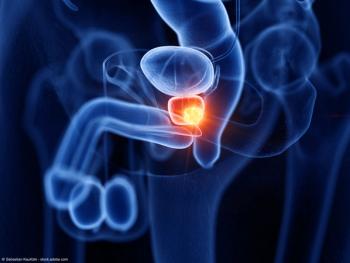
Trial of novel PSMA-PET imaging agent in prostate cancer hits enrollment milestone
The PROPELLER trial is exploring the novel PSMA-PET imaging product 64Cu-SAR-bisPSMA in patients with treatment-naïve, histologically confirmed prostate cancer who are scheduled for radical prostatectomy.
Half of the enrollment goal has been met for the phase 1 PROPELLER trial exploring the novel PSMA-PET imaging product 64Cu-SAR-bisPSMA in patients with treatment-naïve, histologically confirmed prostate cancer who are scheduled for radical prostatectomy.1
The study has enrolled 15 patients of the targeted enrollment goal of 30 patients. To enroll in the trial, patients must have at least 1 of these intermediate- to high-risk features: a PSA level ≥10.0 ng/ml within 12 weeks prior to enrolling, a Gleason score of 7 (4+3) or higher, and/or a clinical stage ≥T2b.2
The study aims to assess the safety, tolerability, and efficacy of 64Cu-SAR-bisPSMA. Patients will receive imaging with 64Cu-SAR-bisPSMA, which will subsequently be sent to blinded central readers who will determine the capability of the agent to detect primary prostate cancer and identify secondary prostate cancer. The study will also assess the image quality across various doses of 64Cu-SAR-bisPSMA .
The estimated completion date of the study is March 2022.
"The preliminary data from the patients imaged in the PROPELLER trial to date looks very promising as it supports the evidence of higher uptake of 64Cu SAR-bisPSMA in the tumors that has been shown in the pre-clinical studies. Higher uptake in the tumours means that they are more visible on the PET scans and hence have a higher chance of being detected. These initial results are encouraging for further development of this product as a diagnostic, and the higher uptake and retention also make it an exciting therapeutic target with 67Cu,” Louise Emmett, MD, MBChB, BSc, St Vincent's Hospital Sydney, principal investigator of the PROPELLER trial, stated in a press release.
“In addition to the anticipated clinical benefits, having access to centrally manufactured products has the potential to improve patient care by providing an alternative to currently used short-lived diagnostic radioisotopes, such as 68Ga and 18F, the production of which can pose challenges in delivering critical imaging scans to patients with cancer on time. I am very pleased to be working with Clarity on the Targeted Copper Theranostics platform of products, having recently completed the C-BOBCAT trial of SAR-Bombesin, in hopes that these products will improve the current treatment paradigm for oncology patients," added Emmett.
64Cu-SAR-bisPSMA is also being explored in the phase 1/2a SECURE trial (NCT04868604),3 which is examining the imaging agent along with the PSMA targeted therapy 67Cu-SAR-bisPSMA in patients with metastatic castration-resistant prostate cancer. In the open-label, single-arm, dose-escalation trial, 64Cu-SAR-bisPSMA will be used for the selection of appropriate patients who will then receive targeted treatment with 67Cu-SAR-bis-PSMA. Recruitment has been completed for the initial dosimetry phase of the trial.
References
1. Fifty percent recruitment milestone for PROPELLER prostate cancer trial Published online December 1, 2021. Accessed December 9, 2021. https://prn.to/3oHlmFa.
2. NIH ClinicalTrials.gov. Positron Emission Tomography (PET) Imaging of Participants With Confirmed Prostate Cancer Using 64Cu-SAR-bisPSMA (PROPELLER) (PROPELLER) Last update August 18, 2021. Accessed December 9, 2021. https://clinicaltrials.gov/ct2/show/NCT04839367
3. NIH ClinicalTrials.gov. 64Cu-SAR-bisPSMA and 67Cu-SAR-bisPSMA for Identification and Treatment of PSMA-expressing Metastatic Castrate Resistant Prostate Cancer (SECURE). Last update May 3, 2021. Accessed May 5, 2021. https://clinicaltrials.gov/ct2/show/NCT04868604.
Newsletter
Stay current with the latest urology news and practice-changing insights — sign up now for the essential updates every urologist needs.






